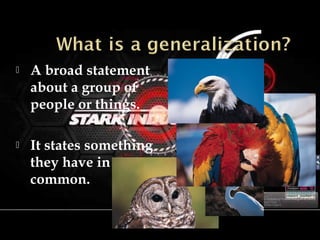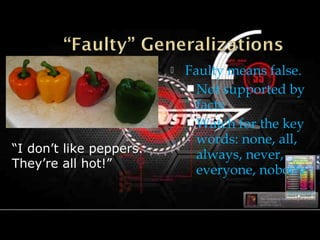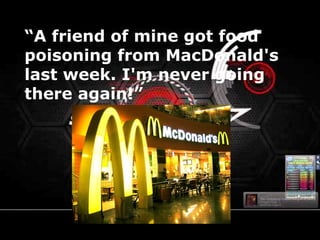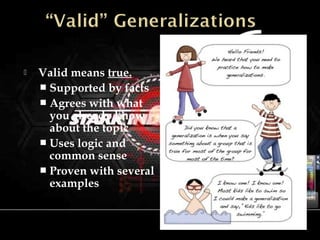Making Generalizations
- 1. By: Harry Lester Galicia
- 2.  A broad statement about a group of people or things.  It states something they have in common.
- 3.  Faulty means false. Not supported by facts Watch for the key words: none, all, always, never, everyone, nobody “I don’t like peppers. They’re all hot!”
- 4.  What is wrong with this generalization?  How could you make it a valid generalization?
- 5. “A friend of mine got food poisoning from MacDonald's last week. I'm never going there again!”
- 6. Fords Ford is an American-made car. I owned a Ford, and it broke down all the time. A car that breaks down all the time is not very good. American-made cars are not very good.
- 7.  Sometimes  Always  Never  Most  Many  All  Generally
- 8.  Valid means true.  Supported by facts  Agrees with what you already know about the topic  Uses logic and common sense  Proven with several examples
- 9. Ginger is one of my best friends. When I enter my home, she races to greet me with kisses and excited leaps. She acts like it’s been eight days since she’s seen me, instead of the actual eight hours. Her coat is honey brown; her eyes are large and loving.
- 11. She’s a six- month old cocker spaniel puppy, a breed originally intended to hunt birds in England. Her faithful companionship comforts me when I’m sad or sick. Her playfulness makes me laugh when she races after a toy I’ve tossed. All cocker spaniels make perfect pets.
- 12.  All cocker spaniels make perfect pets.
- 13. • Is this a valid generalization? • Does the author: – Use facts to support the idea? – Share past experiences to support the idea? – Provide several examples? – Use logical thinking?
- 14.  Generalizations make broad statements about a group.  Some a valid, others are faulty.  Valid generalizations are supported by facts, examples, and logical thinking.  Watch out for words like all or never.
Editor's Notes
- Birds have feathers.
- The key words change the meaning of the generalization. Some flowers have petals. Flowers always have petals. Flowers never have petals. Most flowers have petals. Many flowers have petals. All flowers have petals. Flowers generally have petals. You have to be VERY careful if you use the word never. Does it NEVER happen?? Is it remotely possible?? Likewise you have to be careful with the words always and all. They include the whole group. Does it ALWAYS happen??














